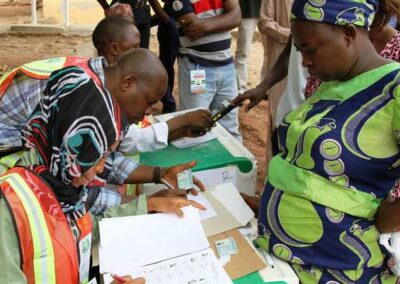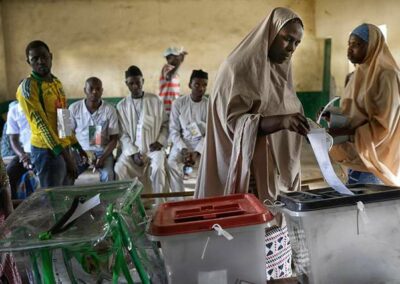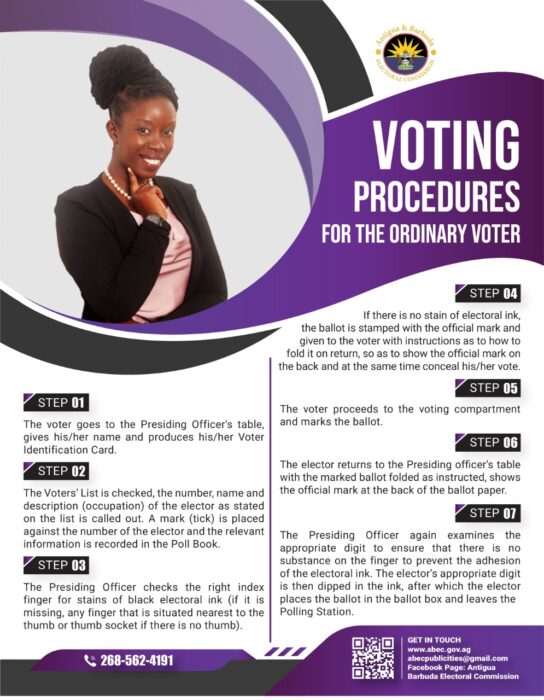The selection of Nigeria’s next president has begun. Millions of voters are already casting their votes for one of the 18 candidates for the presidential election. Simultaneously, the representatives of the people in the country’s National Assembly are also being voted for in the election.
Nigeria, a country of over 200 million people, has about 93 million citizens registered to vote and only 87 million of these voters would be able to perform their franchise in the ongoing election because they are the only ones with the permanent voters’ card (PVC), a requirement to cast a ballot.
The Independent National Electoral Commission (INEC), Nigeria’s electoral umpire, said voting would begin at 8:30 am and end at 2:00 pm on Saturday. The Chairman of the body, Professor Mahmud Yakubu added that voters in the queue before 2:00 would be allowed to vote, even if the election passes its official closing time.
However, in various polling units across the country, electorates are still waiting for electoral officials, with many voters saying it was a tactic to disenfranchise them.
“A deliberate attempt to disenfranchise people”
The Independent National Electoral Commission has consistently said it was ready for Saturday’s presidential elections. However, some voters are doubting the ability of the body to conduct a free and fair election due to the happenings on election morning.
“Sangotedo [Primary School Poling Unit] 015 and 016 election materials [are] not here as of 12:05,” a Twitter user wrote. “It’s alleged that the materials have been hidden in Sangotedo Baale’s palace. There is a deliberate attempt to disenfranchise people here.”
The pulse news agency reported that in Warri, Delta State, election materials had not arrived at some voting points at noon.
However, some electorates have vowed to stay back until materials arrive as they suspect it could be a strategy to rig the election.
“Team anywhere INEC staff are yet to show up, pls everyone should remain patient. It’s the strategy to make people go home and they will come late and rig the election,” another Twitter user wrote. “[Please] we must all exercise patience by waiting even if it takes sleeping there.”
At about 1 pm, several voting centres were still without election materials despite the electoral commission’s instruction that voting would end at 2:30 pm. However, there is the possibility that voting could be postponed to the following day as it happened in the previous presidential election.
The reports of voters suppression
One method used to win elections in Nigeria is voter suppression. Politicians target the stronghold of opponents and do all they could to deprive voters of coming out to cast their ballots. Already, there are reports in Lagos State that some strongholds of the Labour Party’s presidential candidate, Peter Obi.
“If you don’t speak a particular language, you are not allowed to enter,” a Twitter user wrote regarding the situation in Lagos State. “This is a shambolic election.”
Other voters have suggested that they are being threatened to vote for Bola Ahmed Tinubu, the presidential candidate of the ruling All Progressive Congress, even if he is not their preferred candidate. Antigua news could not independently verify these claims at the time of this report.
Another method of voter suppression is the destruction of polling boots and other election materials in the strongholds of opponents. In Lagos, Kogi, and Delta State, there have been reports of ballot box snatching and the destruction of election materials.
How to win the election
To win a presidential election, a candidate must win the majority of votes and win at least 25% of the votes in ⅔ of the 36 states. That means a candidate must win 25% per cent of the votes cast in 25 states. If there is no clear winner on the first ballot, there would be a second election between the first two candidates within 21 days.
However, with the conduct of the election in Nigeria, it is unlikely that the candidates that lost would accept the outcome of the result at the end of the day. That could lead to violence or a lengthy judicial review of the process.
Read more about Nigeria’s presidential election








0 Comments